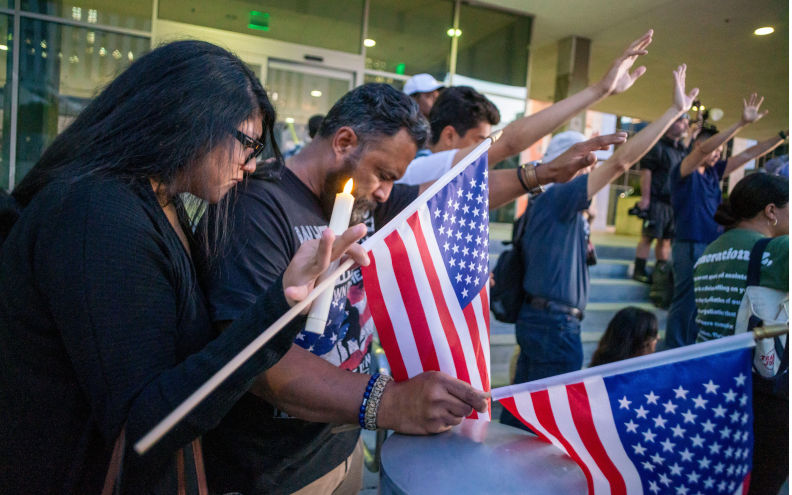The creation of a martyr: Eerie parallels
September 25, 2025
If one wants to understand the current elevation of Charlie Kirk in the US to the status of a martyr, offered as sacrifice linked to national rejuvenation, even salvation, one need look no further than similar elevation by the Nazis of Horst Wessel.
Already the parallels are telling, if not frightening, providing an eerie portent of what is likely to come concerning Kirk.
Wessel, a member of the SA, after his murder in January 1930 by two members of the Communist Party, was immediately elevated to serve as a core propaganda symbol for the Nazi Party.
Nazi propaganda chief Joseph Goebbels had previously been looking for someone to raise into being a Nazi martyr. His first attempt was with Albert Schlageter, executed in 1923 by the French after being caught attempting to blow up a train in the Ruhr region, at that time occupied by France. There were also the 16 Nazis who had died during the 1923 Munich Beer Hall Putsch. While they would be remembered by the Nazis, it was Wessel around whom was built a devotional cult of martyrdom.
In a parallel with the language around those opposing Kirk, or insufficiently grieving his death, Goebbels called those who had killed Wessel, “degenerate communist subhumans”.
Wessel’s funeral had many of the Nazi elite in attendance, in a crowd Goebbels claimed to have numbered 30,000. Hitler, advised of the risk of attending due to the funeral being held in a strong Communist district, did not attend, but spoke that night, addressing a memorial service at the Berlin Sportpalast before a full house of 14,000 people. Still, those figures can’t match the estimated 100,000, including state elite, who attended Kirk’s memorial service, though Kirk had the advantage of state support, the Nazis having not come to power at the time of Wessel’s death.
Of Wessel, in his funeral oration, Goebbels, in language dripping with religious symbolism, exclaimed, “A Christian Socialist! A man who calls out through his deeds: ‘Come to me, I shall redeem you!’ … A divine element works in him, making him the man he is… One man must set an example and offer himself up as a sacrifice! Well, then, I am ready!…Through sacrifice to redemption… through struggle to victory.”
The parallels to language in Kirk’s memorial service are frightening. As was Wessel, Kirk was described as “a martyr to Christian faith” and to “American freedom”, the two seemingly synonymous. Speakers J.D. Vance, Marco Rubio and Donald Trump Jr drew on Christian imagery, with even Donald Trump making use of such, referring to Kirk both as a “a martyr now for American freedom” and the “greatest evangelist for American liberty”.
We await further parallels, though some already are appearing.
Following Wessels’ “martyrdom”, as part of a developing mythology, a march “Kampflied” (Strong of Struggle), for which he was said to have written the lyrics, was renamed the “Horst Wessel lied” (Horst Wessel Song). It became the official anthem of the Nazi Party, and following the Nazis coming to power in 1933, the co-national anthem of Germany. Though I can find no evidence of Kirk being a song lyricist, songs praising him are already proliferating, with Rolling Stone opining, “Charlie Kirk tribute songs are racking up huge numbers”.
As the mythology concerning Wessels intensified, places were renamed to honour him. The Berlin district of Friedrichshain, where Wessel died, was renamed “Horst Wessel Stadt”, the Bülowplatz in the Mitte district became “Horst-Wessel-Platz”, while later an area of reclaimed land in the rural area of in Schleswig-Holstein was named the “Horst Wessel polder”.
Similar calls are being made for Kirk to be so honoured. Oklahoma Republicans are seeking to legislate that every public university have a “Charlie Kirk Memorial Plaza”, while there are a plethora of other instances, from Arizona Senate president, Warren Peterson planning to rename a highway, to local councils seeking to change street names.
In 1936, Nazi Germany’s Kriegsmarine (navy) commissioned a three-masted training ship naming her the Horst Wessel. One wonders how long it will be before the US Navy launches a ship bearing the name Charles Kirk, though given US shipyard performance that may take time.
German military units also adopted the name of Wessel. During World War II, these included the 18th SS Volunteer Panzergrenadier Division, designated the “Horst Wessel” Division, while both the Luftwaffe’s heavy fighter Wing Zerstorergeschwader 26 and Jagdgeschwader 6 were similarly styled the “Horst Wessel” wing. Trump has taken to changing the names of previously changed US military camps, back to their former designations, mainly commemorating Confederate generals, so it may not be beyond his administration to name one of these, “Camp Kirk”.
Lest it be said comparing Kirk to a street fighter like Wessel is unfair, it ought be remembered, the tongue can often be a far more dangerous weapon than the fist. Kirk uttered some horrendous statements, dripping with misogyny, racism and xenophobia.
As with the cult of Wessel in Nazi Germany, the gathering mythology around Kirk demands adherence, making any criticism of him taboo. The comedian Jimmy Kimmel was subject to the wrath of those who demand full subscription to the myth, while Karen Attiah, opinion editor of the Washington Post, a paper once unwavering in its defiance of executive power in the days of Watergate, was dismissed for merely commenting online, in a disapproving manner, about one of Kirk’s posts on race.
Mythologies have a manner of developing into ideologies, which prohibit any derivation from the required devotion. Such was seen in the Nazi elevation of Horst Wessel. We are now seeing in the US the same play with Charlie Kirk. Seemingly, the more history runs, the more it repeats.
The views expressed in this article may or may not reflect those of Pearls and Irritations.


